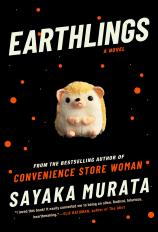Earthlings
Review
Earthlings
EARTHLINGS is a curious novel --- quaint and quirky at the start, then increasingly bizarre and frightening right up until its horrific and unbelievable end. With sparse language and sharp social commentary, masterfully translated by Ginny Tapley Takemori, Sayaka Murata skewers the trappings of modern life and introduces readers to an innocent pushed to the very edge of sanity.
As a child, Natsuki Sasamoto is only happy during her family’s annual visit to Akishina during the Obon festival. There she is in the company of her aunts, uncles and cousins in the natural mountain beauty that surrounds her grandparents’ home, and the abuse she suffers at the hands of her mother and older sister fades (for just a bit) into the background. Most wonderfully, time in Akishina is time with Yuu, her beloved cousin.
"Not quite experimental, but drawing on some postmodern themes and devices, EARTHLINGS is heartrending, resonant and unforgettable."
Yuu is an alien, or so he believes, a condition of dislocation and strangeness to which Natsuki can relate, not in the least because her best friend is Piyyut, an alien from Planet Popinpobopia in the disguise of a stuffed hedgehog. Piyyut has given Natsuki some small magical powers, and Yuu shows her much-needed kindness and acceptance, but none of it can protect her from the dangers at home or the violence she endures at the hands of one of her teachers.
As she grows up, Natsuki finds herself under immense pressure from the Factory, the social norms that demand she get married and start a family, allowing herself to become a cog in the social machine and a slave to her genes and reproductive organs.
As an adult, Natsuki marries Tomoya, a shy man whose familial traumas are only hinted at. Tomoya shares with Natsuki a distrust of the Factory and a revulsion of physical intimacy. Their platonic marriage is one of convenience and reserved friendship. When Natsuki takes Tomoya to Akishina, where Yuu now lives in their grandparents’ home, it is the first time the cousins have seen each other since their behavior sent shockwaves through the family. At first, Yuu seems hesitant to resume talk of aliens and their childish vows. But as the days go by, the trio decide to abandon all connections to the Factory and embrace their alien identities until other members of the Sasamoto family find them in an unimaginable state. Has Popinpobopia finally called the three home, or have they willingly shed their humanity with no safety net or promise of redemption?
As a story, EARTHLINGS packs a brutal punch and delivers several shocks. But as an examination of a character, it is still charming and delightful because Natsuki remains steadfastly herself: emotionally severed and physically traumatized, yet wide-eyed and imaginative with a sweet and genuine affection for Yuu, if for no one else. The novel starts out weird and gets weirder and much darker as it goes on, taking readers to totally unexpected places, but never letting them forget who the villains and innocents are and how responsible society is for letting those innocents down. The depravity that Murata explores runs the gamut from the sadly mundane to the absolutely phenomenal, and still her delivery is deadpan and not without moments of bleak humor.
Not quite experimental, but drawing on some postmodern themes and devices, EARTHLINGS is heartrending, resonant and unforgettable.
Reviewed by Sarah Rachel Egelman on October 9, 2020
Earthlings
- Publication Date: September 21, 2021
- Genres: Fiction
- Paperback: 256 pages
- Publisher: Grove Press
- ISBN-10: 0802157017
- ISBN-13: 9780802157010





